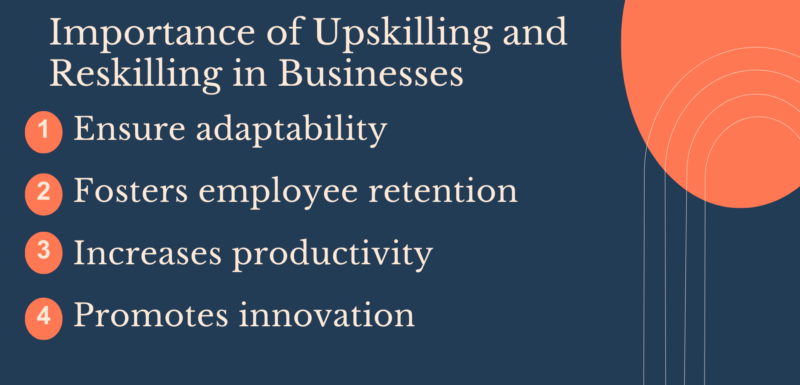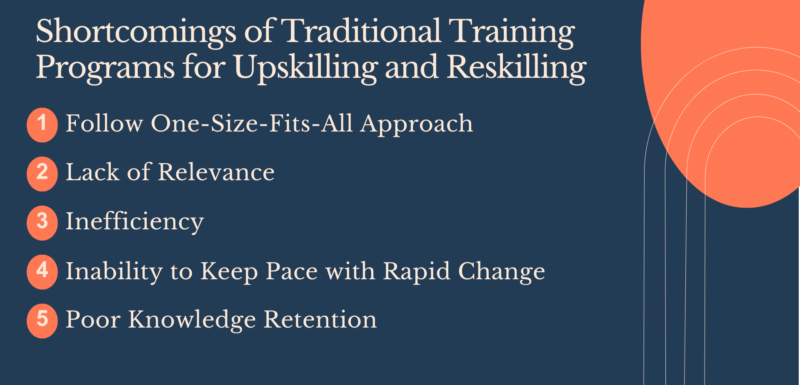
Why Custom eLearning Is The Right Choice For Upskilling And Reskilling
The business landscape is in a state of perpetual flux. Technological advancements, shifting market dynamics, and evolving customer preferences are forcing organizations to adapt at an unprecedented pace. To remain competitive and relevant, businesses must prioritize upskilling and reskilling their workforce. While generic training programs might seem like a cost-effective solution, custom training emerges as the superior choice for driving real and sustainable organizational growth. In this article, we’ll try to understand what upskilling and reskilling are and then explore why custom eLearning is the right choice.
Are you ready? Let’s start!
What Is Upskilling And Reskilling?
In today’s fast-paced business environment, continuous learning is essential. Upskilling and reskilling are crucial strategies for maintaining a competitive edge and ensuring long-term success.
Upskilling refers to enhancing the skillset of existing employees to improve their current job performance. This can include learning new technologies, methodologies, or advanced techniques relevant to their job functions. Reskilling, on the other hand, involves equipping employees with new skills to prepare them for different roles or functions within the organization, which can be vital during times of restructuring or technological change.
Evidently, both are critical for future-proofing the workforce and ensuring business continuity.
Why Are Upskilling And Reskilling Important In Business?
The importance of upskilling and reskilling includes the following.

Let’s take a closer look at each reason.
Ensures Adaptability
It’s so important for businesses to be flexible and adaptable to changes in the market, new technology, and evolving industry standards. A workforce that is always learning and growing is better equipped to embrace these changes and thrive!
Fosters Employee Retention
We all want to feel like we’re growing and developing as people, right? It’s only natural! And when a company invests in their employees’ professional development, it reflects trust in employees’ ability and caliber. These factors make it more likely that the employees will stay with the company for a longer duration.
Increases Productivity
When your employees are well-trained, they’ll be able to do their jobs more efficiently and effectively. This leads to improved employee performance and productivity across the entire organization, which is a win-win for everyone!
Promotes Innovation
We all know that a culture of continuous learning is a great way to foster innovation. Therefore, it is really important to encourage your employees to learn and grow, because when they do, they’re more likely to contribute new ideas and solutions.
What Are The Shortcomings Of Traditional Training Programs For Upskilling And Reskilling?
The one-size-fits-all approach to training and development is often inadequate for addressing the diverse needs of a modern workforce. Some significant shortcomings are listed below.

Now let’s learn about each drawback in detail.
Follow One-Size-Fits-All Approach
Traditional training programs, which often adopt a one-size-fits-all approach, deliver generic content to a diverse audience. This standardized approach for upskilling and reskilling the workforce fails to account for the unique needs, learning styles, and performance gaps of individual employees or teams. This puts the organization at risk of disengagement and a lack of motivation among employees. As a result, such programs often fall short of delivering the desired outcomes, which is definitely something they would want to avoid.
Lack Of Relevance
Ineffective training can have a detrimental impact on employee performance and retention. When employees feel that their training is irrelevant to their work, they are less likely to engage and apply what they have learned. This can lead to decreased productivity, job dissatisfaction, and increased turnover.
Inefficiency
Generic training programs struggle to address the specific skill gaps that hinder organizational performance. They may cover a broad range of topics, but they lack the depth and focus required to develop the competencies essential for success. Moreover, these programs may not align with the organization’s strategic goals, leading to a mismatch between training investments and business objectives. Employees may waste time on training that is not pertinent to their roles or skill levels. This inefficiency can result in lost productivity and increased costs.
Inability To Keep Pace With Rapid Change
The inability to keep pace with rapid change can have detrimental effects on skills development. Traditional training programs, with their long lead times, struggle to respond quickly to emerging trends, resulting in delayed skill acquisition. This limitation can hinder employees from staying competitive in their respective industries. Furthermore, limited access to new knowledge can further exacerbate this issue.
If the curriculum fails to cover the latest industry developments, learners may find themselves ill-equipped to navigate the ever-evolving landscape of their chosen field. As such, it is crucial for organizations to adapt their programs to ensure that employees are equipped with the most up-to-date knowledge and skills necessary for success in today’s quickly changing business world.
Poor Knowledge Retention
When training is not relevant or engaging, employees are less likely to retain the information and apply it to their work. This reduces the overall effectiveness of the training program.
Why Is Custom eLearning The Right Choice For Upskilling And Reskilling?
Custom eLearning offers a solution to the shortcomings of the one-size-fits-all approach by providing personalized learning and relevant training experiences. Here’s a deeper dive into why it’s the right choice for businesses that wish to upskill and reskill their employees in an effective, reliable, and engaging manner.
Relevance And Engagement
What if a chef is made to attend a culinary workshop that focuses solely on baking, while their primary role and objective is to prepare gourmet dinners? The information might be valuable, but it won’t be relevant to their immediate needs, therefore minimizing the impact of the entire initiative.
Similarly, generic training programs often miss the mark for employees who require training on specific skills to perform their jobs effectively. On the other hand, leveraging custom eLearning for upskilling and reskilling employees ensures that the content is tailored to the unique needs of the organization and its employees. This relevance increases the attention, engagement, and motivation levels among learners, leading to better learning outcomes and higher training ROI.
This can be understood with the help of a simple example here: a software development company creates custom eLearning modules focusing on the latest programming languages and tools relevant to their projects. This targeted approach helps developers stay up to date with industry trends, making the training far more engaging and applicable.
Efficiency
I’m sure you’d agree that time is a valuable resource in any business. Keeping this statement in mind, custom eLearning focuses on maximizing efficiency. It does so by concentrating on imparting the skills and knowledge that are directly applicable to the employees’ roles. This minimizes the waste of time and resources and helps employees receive training that supports them to upskill and reskill in a manner that is pertinent to their job functions.
An example for understanding this aspect would be a customer service team needing to improve their conflict resolution skills. But it’s quite possible that not all members of the team would be struggling with the same issues. However, a generic communication course for this situation would cover a broad range of topics like communication skills, best practices, etc., and many of these topics might be irrelevant to employees’ actual needs. Whereas a custom eLearning program can zero in on specific scenarios and techniques that the team can encounter in their daily interactions. This targeted training for upskilling and reskilling your employees is not only more efficient but also more effective.
Flexibility
Every learner has their own unique learning style. In fact, the pace at which they learn also varies. While conventional training methods seem to keep this aspect on the backseat, custom eLearning pays extra attention to it. Custom eLearning courses can be designed in a way that accommodates different learning styles and preferences. Catering to these differences ensures that all employees, regardless of their learning preferences, make the most of their training.
For instance, some employees might learn best through interactive simulations, while others might prefer video tutorials or reading materials. Custom eLearning can incorporate a variety of digital formats to cater to these preferences. This flexibility ensures that each employee can engage with the content in the way that suits them best, enhancing the overall learning experience.
Improved Knowledge Retention
A study by the Harvard Business Review found that personalized learning experiences can increase knowledge retention by up to 60%. This is because learners are more engaged and motivated when the content is directly relevant to their needs and interests.
So when the training is engaging and relevant, employees are more likely to pay attention during the learning process. This sets the foundation for better understanding of concepts, higher retention rate of information, and improved application of concepts to their work. All these factors combine to maximize the employees’ performance and productivity at work. Nowadays, you can also use Artificial Intelligence (AI) for high-impact, immersive custom eLearning development. It will help improve comprehension and learner engagement even further and maximize knowledge retention.
Brand Alignment
One of the best things about custom eLearning is that it gives companies the chance to really show off their unique personalities! It’s a great way to incorporate the company’s branding, culture, and values, and make sure that the training resonates with employees. The importance of aligning the training courses with brand identity can’t be emphasized enough! It plays a vital role in strengthening company culture and ensuring consistency.
For example, there’s a company ABC. It’s a global corporation that values corporate sustainability. Now imagine an off-the-shelf course on sustainability training that talks about the four “Rs” of sustainability, discusses a few practices for sustainability, and done!
On the other hand, the company invests in a custom eLearning program that integrates the value of sustainability into every module. Whether it’s about procurement, production, or customer service, the custom eLearning courses provide a subtle hint of what the company believes and stands for. This way the employees not only learn the necessary skills but also understand how these skills align with the company’s broader mission and values.
Wrapping Up
Custom eLearning is a strategic investment for businesses looking to upskill and reskill their workforce. By addressing the unique needs of the employees, custom eLearning solutions help organizations in upskilling and reskilling their employees and attaining maximum ROI. It does so by delivering relevant, engaging, and efficient training that drives performance and supports long-term success.
